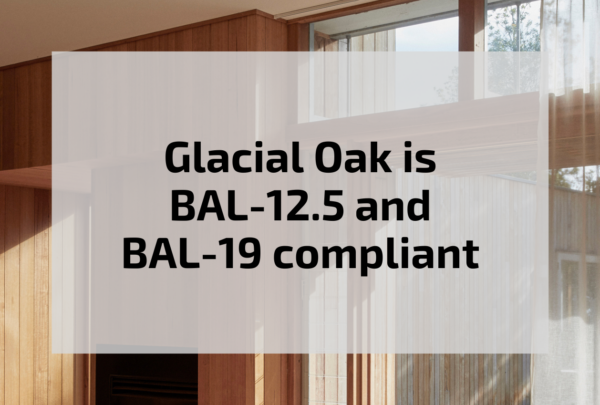The Australian Glass and Window Association has issued a warning to window and door manufacturers about a rise in the use of non-compliant timbers being used as a substitute following the reduction of locally-sourced hardwood options. They warn these alternative timbers don’t meet Australian Standards for use in bushfire-prone areas.
The Australian Glass and Window Association has recently released a technical fact sheet warning manufacturers of using non-compliant timber in the wake of the governments decision to fast-track the closure of Victoria’s native forestry industry.
With Victorian Ash, Messmate and Silvertop Ash, the preferred hardwood options of window and door frame manufacturers, no longer available in volume, this poses a significant challenge for Australia’s window manufacturers to find alternative solutions to sustain production capacity, whilst offering the same standard of quality and safety compliance.
The AGWA are warning window manufacturers to be vigilant in the timber they source, citing the following imported and locally fast-growing hardwoods as examples of timber that does not comply with the AS 3959 requirement for use in BAL-12.5 or BAL-19 window joinery:
The Australian Standard, AS 3959:2018 Construction of buildings in bushfire-prone areas requires timber used in the manufacture of windows for window and door frame assemblies less than 400 mm from the ground or deck, to have a density of 650kg/m3 or greater at a 12% moisture content when used in Bushfire Attack Levels of BAL-12.5 and BAL-19.
This warning from AGWA, while specific to window and door manufacturers, is also applicable to cladding and decking manufacturers following the same path.

Don’t rely on published properties for native timber species if you are using plantation-grown timber. They are based on properties found in native grown, natural forests. Plantation grown species are grown in favourable conditions which increase growth rate. This alters the characteristics and performance of timbers, including density.
Do your research and ensure the timber you’re purchasing has been verified to have a density of 650kg/m3 or greater and ask to see relevant certificates that proves it’s compliance.
Rest assured Glacial Oak, ASH’s improved brand of American Oak, meets BAL-12.5 and BAL-19 requirements. You can view test reports for Glacial Oak Critical Radiant Heat Flux and Glacial Oak Group Number Assessment which provides confirmation of compliance.
ASH have invested significant time and money researching the best alternatives to Victorian hardwoods since the Victorian Government’s announcement. The answer is Glacial Oak. Sourced from a specific, slow-growing region in North America and hand picked by colour and grade, before being milled in Heyfield to the quality and performance of timber expected from ASH.
Amongst other factors, Glacial Oak proved to be the preferred alternative as it exceeds the 650kg/m3 requirement for BAL-12.5 and BAL-19 compliance.
In fact, Glacial Oak’s similarity to Victorian hardwood is remarkable in terms of supply, performance and colour. It even surpasses Victorian ash in aesthetics, versatility and durability.

Victorian manufacturers can now purchase at a more competitive price than ever before.* Call us direct to learn how we are able to sell in line with Victorian ash select grade prices.
That means you can continue to deliver outstanding products without compromising on the bottom line or risking non-compliance with Australian Standards. An imperative reassurance you can confidently pass onto your customers.
We invite you to email sales@ash.com.au or phone one of our Glacial Oak specialists you can provide you will further information or even arrange a tour of our Heyfield (Victoria only) facility to witness the quality and consistency of thousands of cubic meters of Glacial Oak firsthand.
*Applicable to Victorian manufacturers only and relates to 38 and 50mm thicknesses.

"*" indicates required fields
